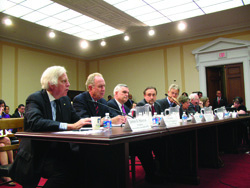Funding cuts threaten federal courts’ ability to do their work, ABA cautions Congress

Photo of James Silkenat at the House Judiciary Committee by Rhonda McMillion.
The ABA is urging Congress to restore cuts in funding for the federal courts that went into effect earlier this year and to protect the judicial branch from future budget reductions that would undermine the ability of the courts to carry out their constitutional and statutory functions.
“Our concern for the judiciary grows each day,” ABA President James R. Silkenat told a forum convened in early October by members of the House Judiciary Committee. The forum was held during the partial government shutdown that ended Oct. 16 after hobbling the government for more than two weeks. The short-term continuing resolution ending the shutdown included $51 million in additional funding for the judiciary.
But Silkenat emphasized to the House members at the forum that “funding cuts mandated by seques-tration pose the greatest challenges to the fair administration of justice and the timely resolution of disputes.”
Sequestration was mandated by the Budget Control Act of 2011. For the federal government’s fiscal 2013 year that ended Sept. 30, the act reduced Congress’ spending cap from slightly more than $1 trillion to $988 billion. The cuts, which went into effect March 1, were imposed throughout the government and included a $350 million reduction in the federal judiciary’s funding between March 1 and Sept. 30. For fiscal 2014, the federal spending cap goes down to $967 billion. Congressional leaders have been trying to work out a deal to adjust the cap even as they struggled to resolve the shutdown and decide whether to raise the federal government’s debt ceiling.
As a result of sequestration cuts, federal courts have imposed downsizing measures and furloughed staff in clerks’ offices, and in probation and pretrial services offices, resulting in a loss of more than 2,700 staff positions as of the end of September. If the judiciary is funded in fiscal 2014 at current 2013 levels, staffing will have to be reduced by an estimated 1,000 additional employees.
GETTING IT RIGHT
Particularly hard hit is the Defender Services Program, which provides counsel to indigent criminal defendants. That program’s $52 million funding decrease resulted in an 8 percent reduction in staff and 19,700 furlough days in federal defender offices across the country. The cuts also resulted in suspension of pay to private attorneys serving on panels established by the U.S. district courts under the Criminal Justice Act to provide reinforcements for defender offices. Payments to CJA panel attorneys were suspended for the last two weeks of fiscal 2013. If the Defender Services Program does not receive additional funding in fiscal 2014, payments to CJA panel attorneys could be reduced by $15 per hour, and payments for work performed during the last four weeks of fiscal year 2014 would be deferred until fiscal 2015.
In his statement to the House Judiciary Committee’s forum, Silkenat said that lawyers have seen firsthand how the timely administration of justice has been severely strained by the funding reductions. He warned that the courts could be subject to even more severe across-the-board cuts if the House and Senate don’t agree on a budget that meets discretionary spending caps mandated by the Budget Control Act or enact an alternative bipartisan deficit reduction plan.
Silkenat, a partner at Sullivan & Worcester in New York City, said members of the House and Senate appropriations committees got it right earlier this year when they both approved fiscal 2014 bills that would increase funding for the federal judiciary by 5.5 percent and 7.5 percent, respectively, over fiscal 2013 sequestration levels.
Although neither bill reached the full House or Senate for a vote, Silkenat said the committee members “sent a clear message” to their colleagues that the judiciary needs to be treated as a funding priority.
This article originally appeared in the December 2013 issue of the ABA Journal with this headline: “Scary Numbers: The ABA cautions Congress that funding cuts threaten federal courts’ ability to do their work.”
This report is written by the ABA Governmental Affairs Office and discusses advocacy efforts by the ABA relating to issues being addressed by Congress and the executive branch of the federal government. Rhonda McMillion is editor of ABA Washington Letter, a Governmental Affairs Office publication.



